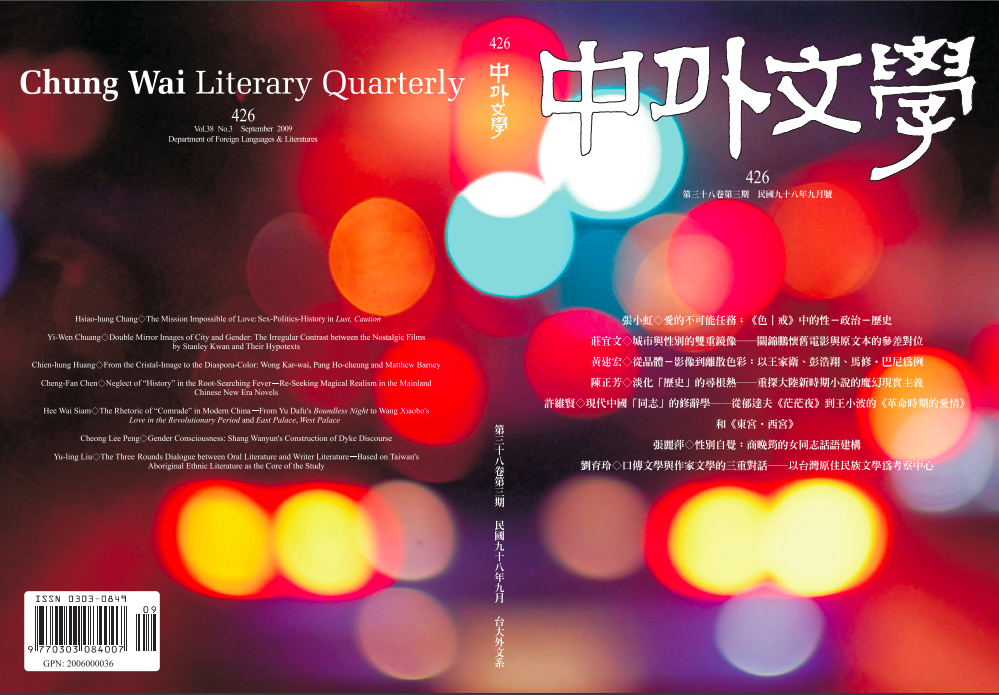第三十八卷 第三期 總426 中華民國98年9月
Vol.38 No.3 September 2009

《中外文學》九月號收錄七篇精彩論文:張小虹以「愛國主義」的國族情感政治出發,探討李安電影《色∣戒》中有關「愛」的「情感召喚」與「影像機制」之議題;莊宜文討論關錦鵬懷舊電影《胭脂扣》、《阮玲玉》與《長恨歌》中女性個體與城市歷史的指涉與對映;黃建宏以王家衛、彭浩翔、馬修‧巴尼(Matthew Barney)為例,再探德勒茲電影論,以及影像再現中的空間-政治問題;陳正芳探究大陸新時期小說的魔幻現實主義如何與「尋根」緊密相關,卻又迴避、淡化「歷史」課題;許維賢追溯「同志」語意在現代中國語境下的流變,論證中國當代同志小說如何在主流文壇中偷渡同性間「罔兩」情欲;張麗萍分析商晚筠小說如何透過同性之愛的題材,在馬來西亞父權思想下建構女性主體意識;劉育玲則探討台灣原住民口傳文學與作家文學間的對話與「對位」關係。
中外文學九月號目錄
Contents
張小虹╱愛的不可能任務: 《色∣戒》中的性-政治-歷史
愛的不可能任務
《色∣戒》中的性-政治-歷史
張小虹*
摘要
◎關鍵詞:愛國主義,國族情感,踐履性,李安,《色∣戒》
★國立臺灣大學外國語文學系教授。
Hsiao-hung Chang╱The Mission Impossible of Love: Sex-Politics-History in Lust, Caution
The Mission Impossible of Love
Sex-Politics-History in Lust, Caution
Hsiao-hung Chang*
Abstract
◎Keywords: patriotism, national affect, performativity, Ang Lee, Lust, Caution
★Professor, Department of Foreign Languages and Literatures, National Taiwan University.
莊宜文╱城市與性別的雙重鏡像 ──關錦鵬懷舊電影與原文本的參差對位
城市與性別的雙重鏡像 ──關錦鵬懷舊電影與原文本的參差對位
莊宜文*
摘要
◎關鍵詞:關錦鵬,《胭脂扣》,《阮玲玉》,《長恨歌》,張派小說
★國立中央大學中國文學系助理教授。
Yi-Wen Chuang╱Double Mirror Images of City and Gender: The Irregular Contrast between the Nostalgic Films by Stanley Kwan and Their Hypotexts
Double Mirror Images of City and Gender
The Irregular Contrast between the Nostalgic Films by Stanley Kwan and Their Hypotexts
Yi-Wen Chuang*
Abstract
◎Keywords: Stanley Kwan, Rouge, Center Stage, Everlasting Regret, Novels by followers of Eileen Chang
★Assistant Professor, Department of Chinese Literature, National Central University.
黃建宏╱從晶體-影像到離散色彩: 以王家衛、彭浩翔、馬修‧巴尼為例
從晶體-影像到離散色彩
以王家衛、彭浩翔、馬修‧巴尼為例
黃建宏*
摘要
這一篇論文,主要延續著我研究上的兩個方向:分別是德勒茲(Gilles Deleuze)的影像哲學,以及電影影像再現中的空間-政治問題。首先,關於德勒茲電影論的思考,則一直集中在該影像理論的「有效性」:他的理論在今天還能夠存在什麼價值-意義?又曾經限於什麼樣的價值-意義之中?德勒茲的電影影像論中作為哲學問題意識的部分就是「時間-影像」,而在其概念整配中,如何進一步提出「潛在的影像」或「影像中的潛在面向」在影像思維中的「新價值」,更是其思想行動的核心。另一方面,影像除了其自身幾近存有論的「流變」意涵(德勒茲的「晶體-影像」與「造假力量」〔puissance du faux〕,與阿岡本〔Giorgio Agamben〕的「不可憶取的影像」〔image immémorable〕)之外,還有影像的再現(意即梅茲〔Christian Metz〕的延續:巴黎第三大學新索邦的分析學派)。
論文分為幾個部份,先以不同於德勒茲的問題意識對於「晶體-影像」進行閱讀,而論者的旨趣則是時間在晶體型態的思考上所挑起的主體性差異,可能觸及影像的政治性問題。接著,論者嘗試將前者接合上傅科(Michel Foucault)在「異托邦」概念中對鏡子的說明,另一方面,將後者對應到瓜達里(Félix Guattari)與德勒茲發展的「畛域」概念上。
◎關鍵詞:晶體-影像,德勒茲,離散,無人稱,王家衛,彭浩翔,馬修‧巴尼
★國立台北藝術大學美術系助理教授。
Chien-hung Huang╱From the Cristal-Image to the Diaspora-Color: Wong Kar-wai, Pang Ho-cheung and Matthew Barney
From the Cristal-Image to the Diaspora-Color
Wong Kar-wai, Pang Ho-cheung and Matthew Barney
Chien-hung Huang*
Abstract
This paper is divided into several parts in accordance with my preoccupation with the theory of image. Firstly, I introduce and develop the concept “crystal-image”, not by following Deleuze’s problematic focused on the Time-Image, but by discussing the political aspect of image regarding the possible differenced subjectivity. This extension of the concept could be connected to the idea of mirror in Foucault’s concept “heterotopias”, as well as to Deleuze and Guattari’s theory of “territory”.
The second part concerns “Diaspora”. When we ponder this serial concept “image-time-politics” in the aesthetico-political reality, we find the relationship of inherence between the “crystal-image” mode of thinking and the condition of Diaspora.
◎Keywords: Cristal-image, Deleuze, diaspora, impersonal, Matthew Barney, Pang Ho-cheung, Wong Kar-wai
★Assistant Professor, School of Fine Arts, Taipei National University of the Arts.
陳正芳╱淡化「歷史」的尋根熱── 重探大陸新時期小說的魔幻現實主義
淡化「歷史」的尋根熱── 重探大陸新時期小說的魔幻現實主義
陳正芳*
摘要
◎關鍵詞:魔幻現實主義,尋根小說,新時期小說,官方歷史
★國立暨南國際大學中國語文學系助理教授。
Cheng-Fan Chen╱Neglect of “History” in the Root-Searching Fever—Re-Seeking Magical Realism in the Mainland Chinese New Era Novels
Neglect of “History” in the Root-Searching Fever—Re-Seeking Magical Realism in the Mainland Chinese New Era Novels
Cheng-Fan Chen*
Abstract
◎Keywords: Magical Realism, root-searching novels, New Era novels, official history
★Assistant Professor, Department of Chinese Language & Literature, National Chi Nan University.
許維賢╱現代中國「同志」的修辭學 ——從郁達夫的《茫茫夜》到王小波的《革命時期的愛情》和《東宮‧西宮》
現代中國「同志」的修辭學
——從郁達夫的《茫茫夜》到王小波的《革命時期的愛情》和《東宮‧西宮》
許維賢*
摘要
◎關鍵詞:同志,友愛,罔兩性,郁達夫,王小波,酷兒,膠片同志
★新加坡南洋理工大學中文系助理教授。
Hee Wai Siam╱The Rhetoric of “Comrade” in Modern China— From Yu Dafu’s Boundless Night to Wang Xiaobo’s Love in the Revolutionary Period and East Palace, West Palace
The Rhetoric of “Comrade” in Modern China
— From Yu Dafu’s Boundless Night to Wang Xiaobo’s Love in the Revolutionary Period and East Palace, West Palace
Hee Wai Siam*
Abstract
◎Keywords: Comrade, Fraternity, Penumbrae, Yu Dafu,Wang Xiaobo,Queer, Celluloid Comrade
★Assistant Professor, Division of Chinese, Nanyang Technological University, Singapore.
張麗萍╱性別自覺: 商晚筠的女同志話語建構
性別自覺
商晚筠的女同志話語建構
張麗萍*
摘要
◎關鍵詞:商晚筠,馬華文學,女同志話語,女性書寫,女性意識,書寫策略
★新加坡國立大學文學院講師。
Cheong Lee Peng╱Gender Consciousness: Shang Wanyun’s Construction of Dyke Discourse
Gender Consciousness
Shang Wanyun’s Construction of Dyke Discourse
Cheong Lee Peng*
Abstract
◎Keywords: Shang Wanyun, Malaysian Chinese Literature, Dyke Discourse, Female Writing, Female Consciousness, Writing strategy
★Lecturer, Centre for Language Studies, National University of Singapore.
劉育玲╱口傳文學與作家文學的三重對話 ──以台灣原住民族文學為考察中心
口傳文學與作家文學的三重對話
──以台灣原住民族文學為考察中心
劉育玲*
摘要
◎關鍵詞:口傳文學,民間文學,作家文學,原住民文學,原住民族文學
★國立東華大學民間文學研究所博士生。
Yu-ling Lu╱The Three Rounds Dialogue between Oral Literature and Writer Literature —Based on Taiwan’s Aboriginal Ethnic Literature as the Core of the Study
The Three Rounds Dialogue between Oral Literature and Writer Literature
—Based on Taiwan’s Aboriginal Ethnic Literature as the Core of the Study
Yu-ling Lu*
Abstract
◎Keywords: Oral Literature, Folk Literature, Writer Literature, Aboriginal Literature, Aboriginal Ethnic Literature
★Ph.D. Student, Graduate Institute of Folk Literature, National Dong Hwa University.
